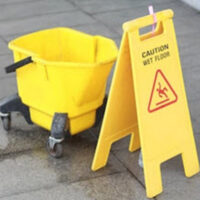How a Grocery Store’s Inspection Policies Affect Your Georgia Slip and Fall Accident Case

Slip and fall claims against Georgia retail stores often turn on the issue of “constructive notice.” The idea behind constructive notice is that a property owner cannot claim ignorance of a hazard that they should have discovered by exercising basic due diligence. For example, if a customer slips on a puddle of liquid in the middle of a store aisle, the owner can be said to have constructive notice even if none of their employees actually saw the puddle beforehand.
Indeed, one of the main tenets of constructive notice is that owners who open their premises to the public are expected to have a reasonable policy in place for regularly inspecting aisles–and other open areas–to identify potential hazards. A store owner cannot allow a puddle of liquid to simply remain on the floor for several hours. They are expected to have their managers and employees conduct inspections at a reasonable interval throughout the business day.
Atlanta Judge Declines to Dismiss Slip and Fall Claim Against Kroger
A recent decision from a federal judge here in Atlanta, Hendrix v. Kroger Co., demonstrates how many slip and fall defendants try to get around the issue of constructive notice. This case involves a plaintiff who was shopping at a local Kroger store one afternoon when she slipped and fell on some liquid. She subsequently filed a personal injury lawsuit against Kroger.
Kroger argued it had a “reasonable” inspection policy in place that required employees to conduct a regular “sweep” of the aisles and that it was entitled to summary judgment on that basis. Summary judgment means the judge decides a case as a matter of law without the need for a jury to resolve any factual disputes. In this case, however, the judge rejected the demand for summary judgment.
The court noted that the burden of proof is on the defendant in a slip and fall case to show (1) it had a reasonable inspection policy in place and (2) the policy was actually followed at the time of the plaintiff’s accident. Here, Kroger presented evidence it “had a goal” to complete at least eight “sweeps” of the store each day–or less than one inspection every hour if the store remained open longer than eight hours. On that point alone, the judge said it was “likely that a jury question exists as to whether the inspection procedure here was reasonable.”
But even assuming the policy was reasonable, the judge said Kroger had yet to present sufficient evidence its employees actually followed the policy on the day of the plaintiff’s accident. In fact, the only evidence Kroger submitted was an affidavit from a store manager, who was not on-duty at the time, that merely stated the policy was followed. So for now, the plaintiff could proceed with her slip and fall claim.
Contact Hawkins Spizman Trial Lawyers Today
There are a number of factors that need to be considered when filing a slip and fall lawsuit in Georgia. A qualified Atlanta personal injury lawyer can review your case and advise you of your rights and options for seeking compensation. Contact Hawkins Spizman Trial Attorneys today. We serve clients throughout Georgia including Atlanta, Dunwoody, Alpharetta, Cobb County, Fulton County, Gwinnett County, Johns Creek and Sandy Springs.
Source:
scholar.google.com/scholar_case?case=11415898274986081343
